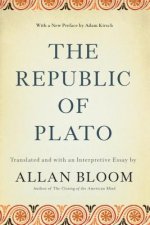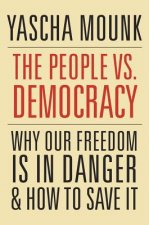
Kód: 04535852
Pragmatist Democracy
Autor Christopher K. Ansell
Barack Obama is often lauded as a 'pragmatist,' yet when most people employ the term, they mean it in the vaguest sense: that he's practical and willing to compromise to get things done. However, the public philosophy of pragmatis ... celý popis
- Jazyk:
 Angličtina
Angličtina - Väzba: Brožovaná
- Počet strán: 296
Nakladateľ: Oxford University Press Inc, 2011
- Viac informácií o knihe

Mohlo by sa vám tiež páčiť
-

Convent
43.93 € -

Granta 88
24.27 € -3 % -

Constructing Therapeutic Narratives
157.01 € -

Interfaces For The 21st Century: New Research Directions In Fluid Mechanics And Materials Science
158.55 €
Darujte túto knihu ešte dnes
- Objednajte knihu a vyberte Zaslať ako darček.
- Obratom obdržíte darovací poukaz na knihu, ktorý môžete ihneď odovzdať obdarovanému.
- Knihu zašleme na adresu obdarovaného, o nič sa nestaráte.
Viac informácií o knihe Pragmatist Democracy
Nákupom získate 168 bodov
 Anotácia knihy
Anotácia knihy
Barack Obama is often lauded as a 'pragmatist,' yet when most people employ the term, they mean it in the vaguest sense: that he's practical and willing to compromise to get things done. However, the public philosophy of pragmatism, which has been the subject of a rich revival in the past couple of decades, is far more than this. First developed in the late nineteenth century, pragmatism is primarily a way of thinking-an anti-dualist philosophy that attempts to overcome the dichotomies between self and object, nature and culture, mind and body, theory and practice, and fact and value. When applied to governance, pragmatists advocate the use of tactics like third party mediation and problem-solving to achieve anti-dualist principles: cosmopolitan localism, analytical holism, progressive conservatism, and processual structuralism. In Pragmatist Governance, Chris Ansell begins with a theory of the concept and then explains why the approach is ideal for addressing today's governance problems. For instance, while many think that bureaucracy's unchecked growth is the fundamental problem facing democracy today, pragmatism suggests the opposite: that public agencies can effectively manage the relationship between governance and democracy if they focus on building consent for public problem-solving. Ansell argues that wishing away bureaucracy will not do given what we know about the indispensible role of institutions in contemporary governance. Utilizing pragmatist concepts, Ansell rethinks the design of institutions, arguing that they are neither the simple products of rational design that can be endlessly tinkered with nor 'congealed taste'-where institutions represent the timeless customs and values of a people. Along with overcoming this dualism, Ansell also challenges us to rethink our approach to governance. Instead of moving from one extreme to the other-from bureaucracy to 'post-bureaucracy' or 'public entrepreneurialism'-pragmatism would not merely seek to replace one (hierarchical bureaucracy) with the other (a 'flat,' entrepreneurial organization), but rather to hitch the two approaches together in an innovative amalgam where organizational leaders constantly interact with and learn from street-level bureaucrats. Pragmatist Governance concludes that if government is to regain public trust, the technical knowledge of experts must be brought together with sensitivity to local problems, situations, and knowledge. The answer lies not, however, in a diminished bureaucracy. That may only deepen distrust. Rather, the emphasis should be on taking the best of both sides to find innovative and effective ways to solve enduring public problems.
 Parametre knihy
Parametre knihy
Zaradenie knihy Knihy po anglicky Humanities Philosophy Social & political philosophy
67.90 €
- Celý názov: Pragmatist Democracy
- Podnázov: Evolutionary Learning as Public Philosophy
- Autor: Christopher K. Ansell
- Jazyk:
 Angličtina
Angličtina - Väzba: Brožovaná
- Počet strán: 296
- EAN: 9780199772445
- ISBN: 0199772444
- ID: 04535852
- Nakladateľ: Oxford University Press Inc
- Hmotnosť: 484 g
- Rozmery: 233 × 161 × 20 mm
- Dátum vydania: 29. September 2011
Obľúbené z iného súdka
-

The 48 Laws of Power
26.11 € -4 % -

GOVERNMENT OF SELF AND OTHERS: LECTURES
25.29 € -7 % -

Free Will
9 € -23 % -

Change or Die
17.20 € -11 % -

A Conflict of Visions
29.28 € -

End of History and the Last Man
16.58 € -23 % -

Justice as Fairness
35.84 € -15 % -

Candlestick Charting Explained Workbook: Step-by-Step Exercises and Tests to Help You Master Candlestick Charting
28.57 € -18 % -

Beyond Nature and Culture
41.99 € -4 % -

Frames of War
12.90 € -4 % -

Machinic Unconscious
16.79 € -17 % -

Methodology of Scientific Research Programmes: Volume 1
34.71 € -4 % -

City of the Sun
9.62 € -

Divine Left
16.38 € -6 % -

On Tocqueville
17.81 € -10 % -

Lean Thinking
28.06 € -22 % -

The Republic
13 € -21 % -

Essential Drucker
20.48 € -

Anarcho-syndicalism
11.67 € -18 % -

Fashion System
17.71 € -23 % -

Republic of Plato
19.45 € -20 % -

Ideas Have Consequences
18.73 € -12 % -

21 Indispensable Qualities of a Leader
23.34 € -4 % -

Discourse on Inequality
10.74 € -14 % -

On Populist Reason
16.89 € -21 % -

Years of Rice and Salt
9.41 € -18 % -

Calendar of Wisdom
10.13 € -22 % -

Oxford Handbook of Political Ideologies
68.21 € -

Political Philosophy
15.35 € -21 % -

One-Dimensional Man
23.24 € -4 % -

Facing Gaia
27.65 € -2 % -

Radicality of Love
14.13 € -3 % -

Violence and the Sacred
27.24 € -4 % -

Between Past and Future
19.86 € -3 % -

Modern Social Imaginaries
25.08 € -11 % -

Managing Your Manager: How to Get Ahead with Any Type of Bos
19.76 € -15 % -

What is Power?
18.63 € -

Habermas - A Biography
27.03 € -34 % -

Leviathan
7.57 € -15 % -

Proposed Roads to Freedom
11.05 € -

General Theory of Law and State
60.22 € -

Schizo-Culture
38.81 € -5 % -

Common Sense, The Rights Of Man And Other Essential Writings
8.08 € -3 % -

People vs. Democracy
34 € -

Time for Revolution
38.81 € -

Critical Models
47.72 € -

Common Good of Constitutional Democracy
59.19 € -

Malign Velocities - Accelerationism and Capitalism
13.61 € -17 % -

Platform Capitalism
14.02 € -2 %
Osobný odber Bratislava a 2642 dalších
Copyright ©2008-24 najlacnejsie-knihy.sk Všetky práva vyhradenéSúkromieCookies



 21 miliónov titulov
21 miliónov titulov Vrátenie do mesiaca
Vrátenie do mesiaca 02/210 210 99 (8-15.30h)
02/210 210 99 (8-15.30h)